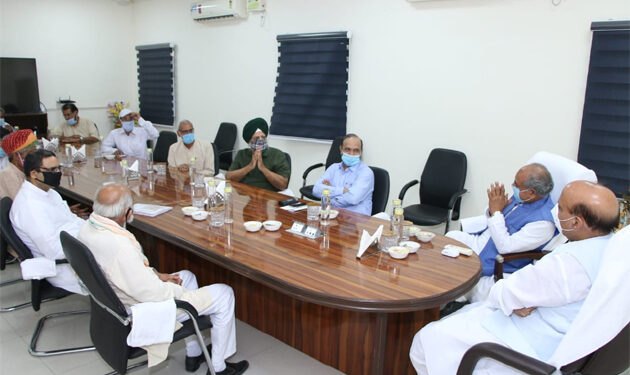NE NEWS SERVICE
NEW DELHI. OCT 7
The Centre on Tuesday allayed the fears of farmers on agri laws. A meeting of important farmer leaders took place on Tuesday evening at the residence of the Union Defence Minister Rajnath Singh on the agri legislations. The meeting was joined by the Union Agriculture Minister. Narendra Singh Tomar. It was moderated by Dr MJ Khan, Chairman, Indian Chamber of Food and Agriculture (ICFA). The first time ever five Padam Shri awardee farmers joined the meeting. In addition, five other important farmer leaders also joined the meeting. This was the second meeting with the farmer leaders, a government official said.
All the important farmer leaders expressed confidence that these legislations will be helpful to the farmers as the same will provide extra options, as the current Mandi system is not adequate to serve all the farmers. In fact, less than 20% of farmers are able to access the current system of procurement by the mandi system and local traders. The current system is cumbersome and exploitative and as the organised sector gets into the agri market, farmers will get more options to choose from, said Padam Shri Kamal Singh Chauhan, who was joined by Padam Shri Awardee farmers, Ram Saran and BB Tyagi from UP, Narendra Singh from Haryana and Jagdish Pareek from Rajasthan, who echoed the same sentiments. Pushpender Singh, President, Kisan Shakti Sangh, Harpal Singh Grewal, Organic Movement, Man Singh Yadav, Chairman, Agri Board, and Bijendra Singh Dalal, President, Haryana Pragatisheel Kisan Manch also expressed confidence in the long-term benefits of these legislations. They hoped that farmer-industry partnerships will actually benefit the farmers. Pushpender Singh, however, suggested that sale-purchase of MSP crops below MSP be made a cognizable offence.
Agriculture Minister Tomar listed down the benefits of the legislation in terms of private sector participation in procurements and partnerships for investments in infrastructure development, logistics, supply chain, processing, agribusinesses, and trade.
Responding to the point raised by the farmers about making below MSP a punishable offence, Defence Minister Rajnath Singh said that this will hamper the market functioning and adversely affect the farmers, adding that if the quality of grains is not good the buyer will turn him back. But today the farmer is at least able to sell on negotiated price.
Moderating the discussions, Dr MJ Khan said that our policies continued to be production centric and did not shift to post-production gamut of activities with times, namely processing, value addition, supply chain, marketing, trade etc. While India contributes roughly 8% to the global farm GDP at $5 trillion, but its share in the trade is just 2% at$39 billion, out of global trade of $1.9 trillion.
Dr. Khan said that while investments in infrastructure, logistics, supply chain, processing, agribusinesses and trade is needed, but, the private sector can never invest in an over-regulated system, which the present scenario, before the three agri legislations, presented. So what were the options before the Government and what are the global experiences before us? And the opinions of the experts and expert committees constituted from time to time for this purpose? It can be said without an iota of doubt that the world over, the farm sector could unleash its potential only after the marketing reforms were carried out. The best example is of China, where President Deng Xiaoping introduced agri marketing reforms in 1980 and that transformed China’s farm sector with a boost to processing, agribusinesses, post-harvest infrastructure and trade.
The key concern being expressed by the farmers is that the MSP may go away and the key demand being put forth is that no one should be allowed by law to buy below MSP. They want these two demands to be factored into the legislations. The Defence Minister said there is no reason for apprehension on this count and MSP was never part of the legislation. Tomar said that we have declared MSP after these legislations and the procurement is being done accordingly, then why the confusion?










